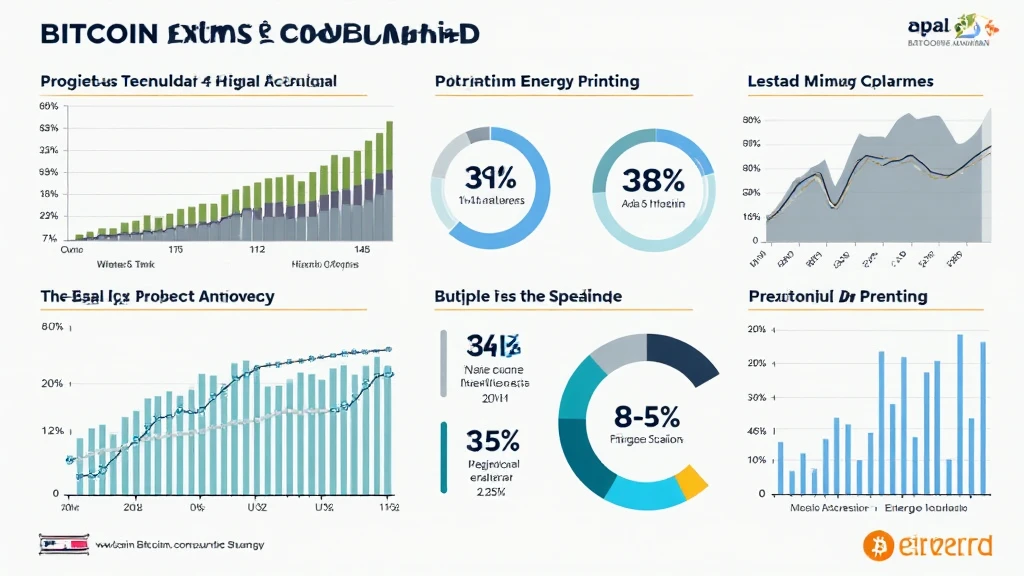Introduction
As the world becomes increasingly intertwined with digital currencies, the rise of Bitcoin mining in countries like Vietnam raises significant questions about energy consumption and environmental impact. According to reports, Vietnam’s Bitcoin mining activities have surged, correlating with a growing number of users and advancements in blockchain technology. One alarming statistic is that the global Bitcoin mining process consumes around 130 TWh annually, equivalent to the energy consumed by countries like Argentina. In Vietnam, the adoption of cryptocurrencies and blockchain technology has skyrocketed, with a user growth rate of over 150% between 2021 and 2023. This rapid expansion begs the need for a thorough analysis of Bitcoin mining energy consumption, particularly in the context of Vietnam. In this article, we will delve into various factors affecting energy consumption in Vietnam’s Bitcoin mining, explore alternative avenues for sustainable practices, and analyze the future implications for both miners and policymakers.
The Current Landscape of Bitcoin Mining in Vietnam
Vietnam has swiftly emerged as a hotspot for Bitcoin mining over recent years. This surge in activity can be attributed to several factors, including low electricity costs and a burgeoning interest in cryptocurrencies among Vietnamese investors. The Ministry of Industry and Trade projects that electricity demand in Vietnam could rise by up to 10% annually, thus increasing scrutiny over energy-intensive activities like Bitcoin mining.
- Electricity Costs: In Vietnam, the average electricity cost is about $0.08 per kWh, making it more appealing for miners compared to regions with higher energy rates.
- Regulatory Environment: While Vietnam has fluctuating regulations concerning cryptocurrency, the government has not mandated a full prohibition on mining activities, allowing room for growth.
- User Engagement: Vietnamese social media platforms and online forums are buzzing with discussions about Bitcoin, creating a vibrant mining community.
Understanding Energy Consumption in Bitcoin Mining
To grasp the implications effectively, it is crucial to explore how Bitcoin mining consumes energy. The mining process requires substantial computational power, which in turn demands electricity. Each transaction is comprised of cryptographic calculations designed to secure the Bitcoin ledger. The more transactions there are, the more miners need to compete, driving up energy usage. Essentially, Bitcoin mining uses energy similarly to running a small city.

In Vietnam, the Bitcoin mining sector’s energy consumption poses several challenges:
- High Carbon Footprint: Many electricity sources in Vietnam still rely on coal, which significantly contributes to carbon emissions.
- Potential Supply Strain: As more miners enter the game, there is potential for stress on the state’s energy supply system.
- Environmental Impact: The growing number of mining operations could lead to environmental degradation, particularly in regions with already limited resources.
Comparative Analysis: Vietnam vs Global Bitcoin Mining Energy Usage
A crucial part of assessing how Vietnam’s Bitcoin mining operates is to compare its energy consumption levels to global standards. For context, here are some illuminating statistics:
| Country | Annual Energy Consumption for Bitcoin Mining (TWh) | Percentage of National Consumption |
|---|---|---|
| Vietnam | 2.5 | 0.8% |
| United States | 70 | 2.5% |
| China | 65 | 3.9% |
This comparison indicates that while Vietnam’s Bitcoin mining energy consumption is relatively lower in absolute figures, it still constitutes a significant percentage of the country’s energy use.
Strategies for Sustainable Bitcoin Mining in Vietnam
Given the pressing issue of energy consumption, it is crucial for Vietnam to consider sustainable practices in Bitcoin mining:
- Renewable Energy Adoption: Encouraging miners to use solar or wind energy can dramatically reduce their carbon footprint.
- Efficient Hardware: The introduction of energy-efficient mining rigs can help minimize overall energy needs.
- Government Policies: Implementing incentives for miners who adopt sustainable practices could create a win-win situation.
For example, a recent study from Vizion is recommending that Vietnam’s mining sector shift to at least 25% renewable sources by 2025 to mitigate environmental impacts.
The Future of Bitcoin Mining in Vietnam
The future of Bitcoin mining in Vietnam hinges on several factors, including technology adoption, regulation, and international trends. As the global trend towards sustainability continues to grow, Vietnam will need to adapt accordingly. The regulations that emerge from the government will significantly impact how miners operate in this evolving landscape. In addition, community awareness about the environmental implications of mining activities can lead to collective actions that drive change.
Industry experts suggest a promising future where Vietnam can become a leading example of responsible Bitcoin mining. By focusing on sustainability and regulatory clarity, miners can continue operating while also addressing energy consumption concerns.
Conclusion
Bitcoin mining energy consumption in Vietnam presents both challenges and opportunities. As the sector experiences rapid growth, understanding these dynamics is imperative for miners, policymakers, and citizens alike. Solutions such as investing in renewable energy, policy incentives, and community engagement can pave the way for a more sustainable future. The success of these initiatives will determine Vietnam’s position on the world stage regarding cryptocurrency’s ecological impact. This journey will not only benefit miners in Vietnam but also contribute positively to the global conversation about energy and blockchain technology.
In summary, as Vietnam continues to witness an increase in Bitcoin mining activities, it is essential to conduct a comprehensive analysis of energy consumption and its broader implications. The focus should be on adapting practices that not only encourage growth but also align with sustainable principles. As the Bitcoin ecosystem continues to evolve, Vietnam has the opportunity to establish itself as a leading force in responsible and efficient mining practices.




